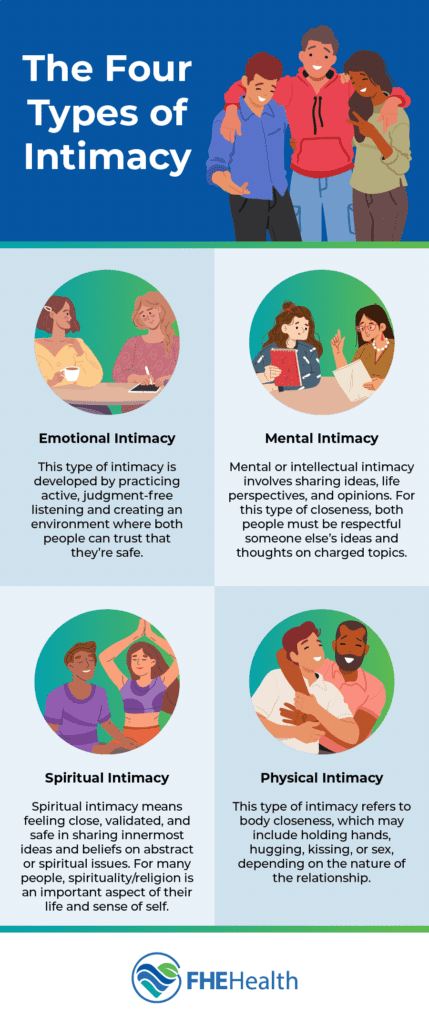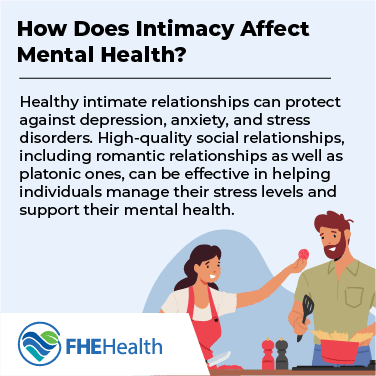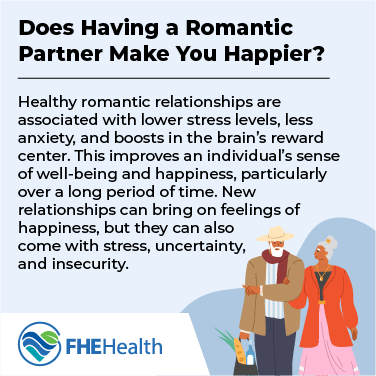
Humans are social creatures, and it’s not surprising that close relationships are a priority for most people. While a strong support system or a romantic partner isn’t a cure for a mental illness, there is a link between mental health and intimacy. Building intimacy in a relationship and maintaining it are among the most effective ways to enjoy a happy, healthy life.
Treatment can begin quickly and discreetly, get started now While many people enjoy maintaining large friendship groups, intimacy among those friends is not necessarily a guarantee. The idea of intimacy refers to openness, trust, and vulnerability. Whether it’s a relationship with a parent, a sibling, a friend, a coworker, or a romantic partner, there may be different types of intimacy depending on power dynamics and the nature of the relationship. While there are numerous types of intimacy, they can generally be rounded up into four broad categories. Being emotionally intimate with someone means being open and transparent with fears, feelings, and thoughts. Building this type of intimacy in a relationship is developed by practicing active, judgment-free listening and creating an environment where both people can trust that they’re safe, even if they have differing opinions and perspectives. Over time, it can be present in most types of relationships, though it requires both people to be open and willing to take risks. Mental or intellectual intimacy involves sharing ideas, life perspectives, and opinions. For this type of closeness, both people must be respectful and open to, or at least open to, considering, someone else’s ideas and thoughts on charged topics, such as social or political issues. This term may have different meanings for different people, but spiritual intimacy generally refers to feeling close, validated and safe when sharing deep beliefs or abstract ideas. Foundational to motivations, values, and identity, spirituality or religion plays a major role in many people’s lives. It doesn’t necessarily require both people to share the same beliefs, but spiritual intimacy depends on an openness to learn from one another without judgment or hidden agendas. Physical intimacy is often what most people think of when they hear the word “intimacy.” This term refers to body closeness, which might include hugging, holding hands, kissing and sex, depending on the relationship. Physical intimacy is often associated with romance, but nonsexual intimacy exists in friendships or between parents and children. Falling for someone isn’t just about feelings—it’s literal brain chemistry at work. Researchers have observed that when you’re drawn to someone, your brain floods with dopamine, the same feel-good chemical that kicks in when you eat your favorite meal or win something. That’s a big reason why new love feels so intense. Then oxytocin jumps in, reinforcing that bond and making the connection feel even stronger. Vasopressin also adds a layer of protectiveness, making you want to hold on tight to what you’ve found. But love isn’t just about feeling amazing all the time—it can also mess with your head in unexpected ways. The brain dials down areas tied to fear and self-doubt, which is why people in love sometimes throw caution out the window and take risks they wouldn’t normally even consider. It’s not just emotions running wild—it’s a full-brain operation, rewiring the way you think and act. In addition to being good for your mood, being close to someone actually changes the way your brain handles stress. The University of Texas at Austin found in a study that stable couples showed more activity in the brain’s pleasure center and less in the areas linked to anxiety. Love does more than just feel good—it actively quiets the parts of the brain that set off stress responses. This isn’t just theory—other studies confirm it. One study showed that kind words from a partner lower stress hormones. Another showed that hand-holding with a long-term partner calms the nervous system far more than doing the same with, say, a new partner or even a friend. The brain picks up on those deep bonds and reacts in a way that makes strong relationships a natural stress buffer. The benefits of intimacy in a relationship on mental health aren’t limited to romantic relationships. Intimate platonic relationships also have a positive impact on the individual’s mental health and can help ward off stress and depression. In an interview, Dr. Scott Kaiser, a board-certified specialist in geriatric medicine, stated that poor social connections and social isolation were just as harmful as smoking 15 cigarettes daily and increased an individual’s risk of developing dementia. In a study published in the Journal of Experimental Social Psychology, researchers measured the impact that proximity to close friends had on a person’s perception of a challenge. In the experiment, researchers asked participants how high a hill was. Participants who were standing next to a friend consistently estimated that a hill would be less challenging to climb than those who were standing alone. Based on that, researchers suggested that having someone we have a close connection with gives us confidence and reduces stress. The weight that stress puts on the brain affects nearly every part of a person’s health, making it difficult to overstate. Some experts estimate that about half of all long-term emotional disorders come from stress. It weakens memory, makes concentration harder and speeds up aging, rather than just affecting mood. Heart attacks, strokes and immune system problems become more likely when stress runs unchecked. Whether platonic or romantic, strong social relationships help people manage stress and support their mental well-being. Mental health rarely improves with just one solution since it is complicated and different for everyone. A relationship built on intimacy doesn’t cure conditions like depression, but it can create a stable environment where someone feels supported instead of alone. Happiness is hard to quantify, and it means different things to different people. In general, however, healthy romantic relationships are associated with lower stress levels, less anxiety, and boosts in the brain’s reward center. This improves an individual’s sense of well-being and happiness, particularly over a long period of time. In the Harvard Study of Adult Development, researchers observed that the happiest, healthiest seniors were those who had long romantic partnerships. Those who were healthiest at age 80 were those who were most satisfied in their relationships when they were 50 years old. New relationships can bring on feelings of happiness, but they can also come with stress, uncertainty, and insecurity. As romantic love evolves over the years into what researchers call companionate love, both partners enjoy a boost in happiness and quality of life. Being in a happy, stable relationship has a positive impact on mental health and may be linked to better self-esteem and an increased sense of self-worth and self-confidence. People in romantic relationships tend to incorporate safer behaviors into their everyday lives, and they generally experience less depression and anxiety. When it comes to romantic relationships and mental health, quality counts. Living in conflict or within an unhealthy romantic relationship is far more damaging to mental health than being alone. Partnerships in which both people work towards good communication, healthy habits, and openness profoundly impact mental health. A cornerstone of emotional and mental health, deep connections in relationships—whether platonic or romantic—help reduce stress and create a greater sense of happiness. Intimacy strengthens bonds, lowers anxiety and brings a sense of security that makes life feel a little easier to handle. Through trust, honest conversations and a willingness to be vulnerable, you can experience stronger relationships and the mental health benefits that come with them. Ready to start? More questions about treatment? Kristina Robb-Dover is a content manager and writer with extensive editing and writing experience... read moreNeed Help?
What Is Intimacy?
What are the Four Types of Intimacy?

Emotional Intimacy
Mental Intimacy
Spiritual Intimacy
Physical Intimacy
What Does Intimacy Do to the Brain?
How Does Intimacy Affect Mental Health?

The Benefits of Intimacy in Relationships for Mental Health
The Connection Between Intimacy, Stress, and Mental Illness
Does Having a Romantic Partner Make You Happier?

Are Romantic Relationships Good for Mental Health?
The Importance of Building Intimacy in a Relationship for Mental Well-Being
Begin your recovery today
![]()
About Kristina Robb-Dover






